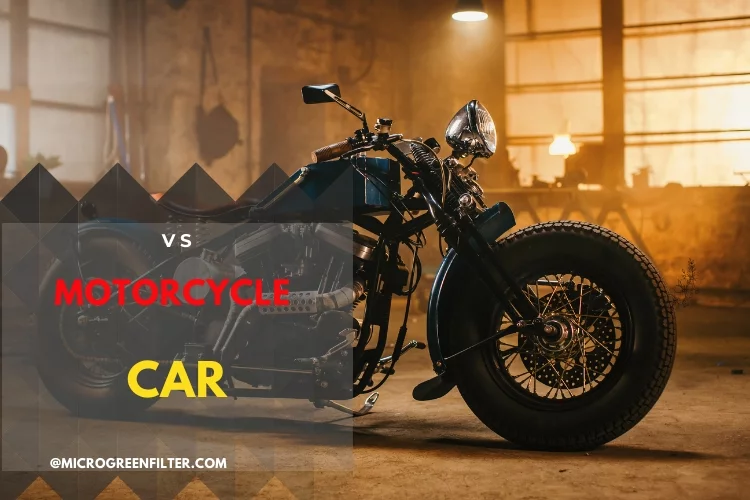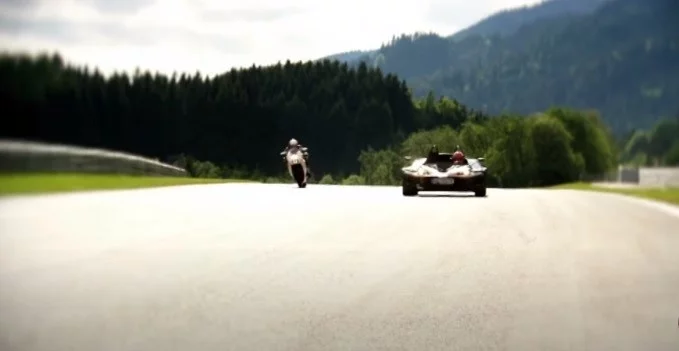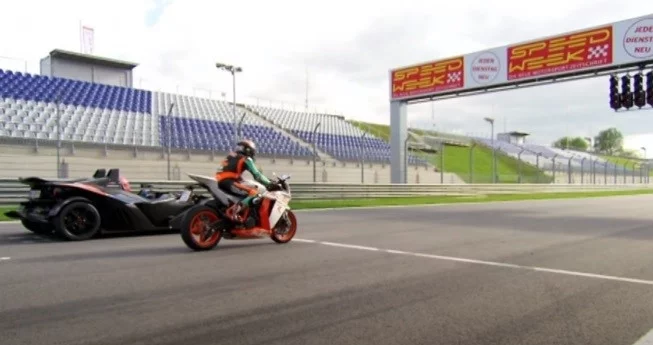Motorcycle vs. Car
by Chris Lewis.
Purchasing a car or a bike? Despite the fact that this phrase and the same question may have circled around in your head numerous times, the same has occupied my thoughts multiple times as well. So today I had an idea and decided to give it a shot by writing about how they are in direct opposition to one another in our daily lives.
Contents
- Motorcycle vs. Car
- The Cost of Ownership for a Motorcycle Is Cheaper Than a Car
- Motorcycles Are More Fuel-Efficient Than Cars
- Motorcycles Can Be Parked in Smaller Spaces Than Cars
- Motorcycles Are Easier to Maneuver Through Traffic Than Cars
- Cars Offer More Protection in the Event of an Accident, While Motorcycles Offer Less Protection
- Conclusion for Car vs Motorcycle

Many of you would believe that the bike doesn't stand a chance versus a car. And many would have the opposite believe for the car not standing a chance against a bike while both are winners and losers in their own ways.
Which is better for you? A motorcycle or a car? This question has been debated for years, but there is no definitive answer. Each option has its own advantages and disadvantages, so the best choice depends on your specific needs and preferences. Here is a closer look at each option to help you decide which is right for you.
Motorcycle vs. Car

Let's compare them one on one in different scenarios.
1. In Terms of Mobility
Motorcycles have a significant advantage over cars in urban areas. The ability to move freely during traffic jams and in crowded areas, as well as taking shorter routes through narrow streets and some roads, allows us to arrive at our destinations in less time than we would have otherwise expected they are easy to find parking for, and their parking fees are reasonable.
The car, on the other hand, takes up more space on the roads, making it more difficult and time-consuming to move around in congested areas. We are also unable to take shorter routes, which results in the estimated time of arrival are longer. Automobiles are required to adhere to more one-way traffic regulations. The time it takes to get to your destination and find a parking spot in many areas can range from a few minutes to an hour. Car parking is much expensive.
2. In Terms of Safety
A motorcycle is a two-wheeled vehicle that is both dangerous and difficult to operate. We are more likely than others to be involved in an accident and to sustain more serious injuries as a result of our recklessness. When travelling at high speeds, even a small stone or bump can be fatal. If something smaller or larger slams into a bike, or if a biker slams into something smaller or larger, both situations are equally dangerous and can result in serious injury to the rider. In order to ride a motorcycle safely, the rider must pay greater attention and concentrate in order to detect and avoid more hazards ahead of him. You must exercise extreme caution at all times, and you must wear protective gear and a helmet at all times as well.

Due to the fact that a car has four wheels and is extremely heavy, it has very little chance of falling off the road unless it is involved in a serious accident or collides with something much heavier than the car itself. When driving a car, you are not required to wear any protective equipment, including helmets. All you need is a safety belt, which is readily available and is an essential part of every car. This seat belt keeps you safe in the event of an accident and prevents you from suffering any serious injuries. Furthermore, the vehicles are equipped with Air Bags and are built to withstand severe collisions.

3. In Terms of Maintenance Costs
Motorcycles are much cost effective than compared to cars. They save you a lot of fuel and give you higher miles per gallon. They are easy and takes least amount of time to get clean and maintain. They have lower costs of labor and spare parts replacements.
The cars on the other hand are money hungry machines. Right after buying a new or used car, you may need to insure it, you may need to change Engine Oils, Break Oils, Gear Box Oil, Engine Coolant, etc. what not and what not. A car has many systems which uses plenty of accessories and spare parts, the need of repairs and replacements are highly probable as the cars are preferred way of travel among the masses. It carries more passengers and has plenty of room to keep the things which makes it more prone to wear and tear.
4. Comparison For the Top Speeds
The speed is where things remain the same. As in papers, Cars offer better specs. And one could easily perceive that the car would win easily because it offers more HP, more Torque and slightly higher top speeds. But Motorcycle on the other hand has lesser weight, which covers all the disadvantages in a one go.
5. For a Speed Enthusiast
Here is some info for you if you are a car or bike enthusiast, you may need to know about the fastest car versus the fastest motorcycle. Here are the specs
| Parameters | Fastest Car | Fastest Motorcycle |
| Name | Ssc Tuatara | Kawasaki Ninja H2r |
|
|
|
|
|
|
|
|
|
|
|
|
|
|
|
|
|
|

For an average consumer like you and me, one can say that a car and a motorcycle both have almost the same speeds and accelerations in the urban and rural areas. It is the matter of personal choice and the needs. Both have their advantages and disadvantages over each other.
In the end, it is up to you to think about your needs and assess what might be most useful for yourself?
A family-oriented person may opt for a car, and a single person or a student may chose a motorcycle over a car
The Cost of Ownership for a Motorcycle Is Cheaper Than a Car
Motorcycles can go anywhere
his is perhaps one of the biggest reasons motorcycles are less expensive than their four wheeled counterparts. Not only are they able to fit in tight spaces, but motorcycles are also capable of traveling on many different types of road. From smooth highways to pothole filled streets, bikes are not limited by the differences in pavement.
While this is certainly an advantage for riders, it can be rather dangerous. Cars are unable to travel down unpaved roads or dirt paths, but motorcycles are capable of doing so, with no issue whatsoever. This can be a major financial benefit, but it's necessary to take into account the risk that comes with this advantage.
Length of ownership
This is another instance where motorcycles are able to compete with cars on an even level. Not only are bikes cheaper to purchase initially, but they are less expensive over time as well. In fact, it is estimated that motorcycles only cost the equivalent of $0.60 per mile to maintain, whereas cars can cost up to $1.00 per mile when considering insurance and fuel price averages.
This is a major benefit for those who ride, but also a big problem for those who don't. Bikes are significantly cheaper in the long run, but they also require a much larger initial investment. While this certainly isn't a problem for those who can afford a bike, it prevents others from being able to do the same.
Safety
While motorcycles can go almost anywhere that a car is capable of driving, they are less safe in the event of a crash. Although motorcycle fatalities have been dropping in recent years, they remain a significant problem for those who ride. In fact, motorcycles are about 34 times more likely to be involved in a fatal accident than those riding in cars as passengers or drivers (statistics from 2013).
When considering the cost of owning a bike, this is something that must be taken into account. Although motorcycles can be significantly less expensive over time, there is a much greater risk of injury and even death when riding one. This greatly reduces the value that comes with owning a bike in comparison to a car, but it does not outweigh it completely.
Motorcycles Are More Fuel-Efficient Than Cars
A new study shows that motorcycles are about 46 percent more fuel efficient than cars. With fuel costs rising, this is certainly good news for most motorcycle riders.
The University of California-Davis conducted the research by putting students in both a car and a motorcycle to see how each vehicle uses gas over the same distance. Researchers found that although the total amount of fuel used is about the same, that distance on a bike takes fewer calories.
"A vehicle that weighs two-thirds as much requires only two-thirds the energy to go the same distance," states David Hoch of Discover magazine, who has written an article on this research. "For motorcycles, the best comparison would be to compare them to the very smallest cars: Smart cars and Mini Coopers."
"The students in two-wheeled mode burned 46 percent less gas than those driving four wheels. Over the course of a year, that would save an average rider about $111 compared to driving a car."
While this is good news for many motorcycle riders, it's not the final answer on which vehicle is more efficient.
"There are many factors to consider when deciding between driving and riding," Hoch writes. "The most important one, arguably, is how far you plan to go."
This study was conducted over a short period of time - 160 miles in total with the students switching vehicles part way through - and in ideal conditions - with little traffic and mostly flat roads.
Motorcycles Can Be Parked in Smaller Spaces Than Cars
Space is at a premium in cities and towns all around the world. Car parking spaces can take up a huge amount of room, and they require additional road space to access them. On the other hand, motorcycles don't need anywhere near as much space when they're parked. This infographic from Ural Motorcycles has interesting data about how motorcycles can be parked in significantly smaller spaces than cars.
Motorcycles Are Easier to Maneuver Through Traffic Than Cars
When traffic is a mess, a motorcycle rider can weave through cars and scooters with ease, while drivers of four-wheeled vehicles often have to wait it out. What makes motorcycles so maneuverable in gridlock?
"In addition to being narrower than most other vehicles on the road, a motorcycle's mass is more concentrated," Meghan Holohan, "This means it's easier for a motorcyclist to find an open space and go," Holohan continues. "The most nimble motorcycles can even lean into turns like bicycles, allowing the rider to make sharper turns."
Cars are too wide to easily navigate tight spaces, but motorcycles' narrow shape makes it easy to slip between them.
Cars Offer More Protection in the Event of an Accident, While Motorcycles Offer Less Protection
The amount of protection motorcycle riders receive during an accident is significantly less than the amount of protection drivers of automobiles receive. Fatalities for motorcyclists are on the rise, while fatalities for automobile drivers are decreasing, according to the Insurance Information Institute. The National Highway Traffic Safety Administration reports that more than 5,000 motorcycle riders were killed in accidents in 2010, while fewer than 4,000 automobile drivers were killed.
Motorcyclists have limited protection during an accident on the road. The size of a motorcycle, typically smaller than a car or truck, makes it easier for other motorists on the road to hit riders with their vehicles. Automobile drivers are protected by seat belts, air bags and padded dashboards in the event of a crash.
Motorcycle riders have more chances of being injured in an accident compared to automobile drivers. The motorcycle's lack of a protective compartment makes riders more vulnerable in a collision with another vehicle, according to the Insurance Information Institute. Helmet use is also less common among motorcycle riders than it is among car drivers.
The Insurance Information Institute explains that the number of fatalities in motorcycle accidents has increased steadily in recent years, while the number of automobile drivers killed during an accident is decreasing. Increased accidents with motorcycles are attributed to more people using motorcycles due to their lower cost compared to automobiles and better fuel economy. The National Highway Traffic Safety Administration reports that motorcycle registrations have increased by 60 percent since 1991.
Conclusion for Car vs Motorcycle
- The cost of ownership for a motorcycle is typically lower than a car
- Motorcycles are more fuel-efficient than cars and can save you money on gas
- Motorcycles can be parked in smaller spaces, which is great for city living
- Motorcycles are easier to maneuver in traffic than cars
- Cars offer more protection in the event of an accident, while motorcycles offer less protection
- Riding a motorcycle can be more dangerous than driving a car
Motorcycles are a great option if you want to save money on gas and enjoy the open road. They are also more maneuverable than cars, which can be helpful in tight spaces or crowded cities. However, motorcycles can be more dangerous than cars, so you need to be aware of the risks and take precautions when riding.
Cars are a good choice if you want to travel long distances or transport large items. They are also safer than motorcycles, making them a better option for families. However, cars cost more to maintain and operate than motorcycles.
 |
 |
 |
 |

About Chris Lewis.
Chris Lewis is a passionate individual with a deep affinity for the world of automobiles. From a tender age, his fascination with cars was nurtured by his father, a seasoned mechanic based in the vibrant city of San Francisco. Growing up under the watchful guidance of his skilled father, Chris developed an early aptitude for all things automotive.
Thoughts on "Motorcycle vs. Car"
 |
 |
 |
 |
Get FREE Filters now. Or latest free tools from our best collections.
Disable Ad block to get all the secrets. Once done, hit any button below
 |
 |
 |
 |